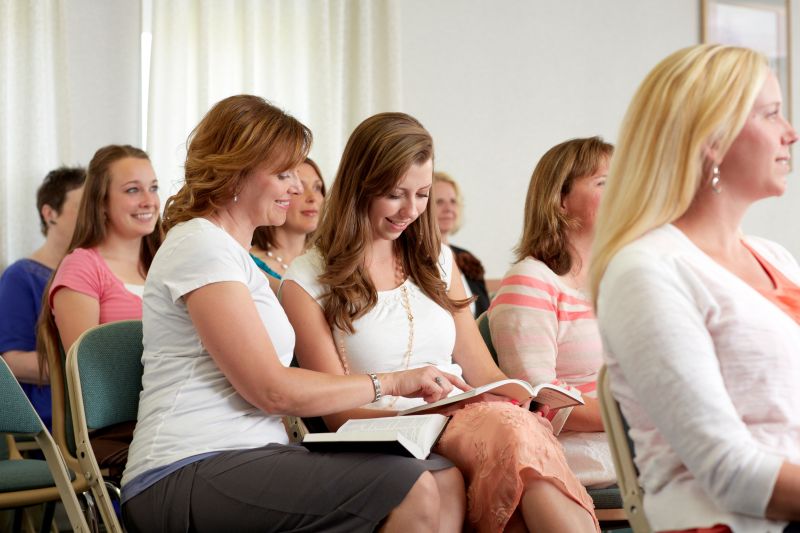
Don’t Feel Like Going to Church Meetings This Week? Here are 4 Reasons You Should Go
I have to admit, I loved having church meetings at home during the pandemic. We still dressed in our Sunday best—down to our shoes. But our sacrament service was small and intimate, and it really brought the Spirit into our home. We all felt it and worked to keep that feeling throughout the Sabbath as well as the rest of the week. So when we started meeting in the church building again, I was a little disappointed. I was reminded of when my kids were young and my husband was sitting on the stand every Sunday as part of the ward leadership. I was left in the pew with three and then four little ones to keep quiet. There were many Sundays when I would come home feeling like I’d just done battle.
I wasn’t sure what I or any of my kids were getting out of Sunday church meetings. I was complaining to my mom one day, and she gave me some sage advice. “You aren’t going to church for you right now. You’re going to church so that your children know how important it is to go to church. They’ll get older and be able to sit quietly. But only if you teach them now.” Those words helped me cope through the years of sitting alone with my little ones. To the world, attending church is becoming less important. Especially with restless kids. Elder D. Todd Christofferson said,
There are those who consider themselves religious or spiritual and yet reject participation in a church or even the need for such an institution. Religious practice is for them purely personal.
But for me, going to church helped me to realize how important it is—and made the decision to return to in-person church easy. Here are three reasons why:
Related: Unspotted from the World: The Injunction and Blessing of Keeping the Sabbath Day Holy
1. Partaking of the Sacrament
One of the main reasons we attend church meetings every Sunday is to partake of the sacrament. Elder David B. Haight taught,
Our most valuable worship experience in the sacrament meeting is the sacred ordinance of the sacrament, for it provides the opportunity to focus our minds and hearts upon the Savior and His sacrifice.
During the passing of the sacrament when my children were little, I was more concerned with keeping them quiet and trying to focus their attention on the Savior than on anything else. I would try to concentrate on the meaning of the sacrament, but it was difficult. Then I was diagnosed with a thyroid condition and I had to take gluten out of my diet altogether. My first thought was, “How will I partake of the sacrament if I can’t eat the bread?” But we worked with the bishop and young men’s leaders to allow me to have gluten-free sacrament bread. The first couple of weeks went smoothly. But then for another few weeks, I didn’t get gluten-free sacrament bread. So I couldn’t partake of the full sacrament. Eventually, we worked out the glitches.
Each Sunday, during the passing of the sacrament bread, one young man would be assigned to return to the sacrament table to pick up the gluten-free bread and bring it to me. No longer could I take the sacrament for granted. I had a symbolic manifestation of the Savior’s love for the one—for me, and the personal nature of the sacrament. As Elder Christofferson explained,
The symbolism of the sacrament of the Lord’s Supper is beautiful to contemplate. The bread and water represent the flesh and blood of Him who is the Bread of Life and the Living Water, poignantly reminding us of the price He paid to redeem us.
2. Sustaining Our Church Leaders
Attending our church meetings allows us to sustain our church leaders. Often we think of sustaining as raising our hand in support when someone receives a new calling. But that is just the beginning. We also sustain and support people in their callings by attending the appropriate meetings, lessons, and activities for which they are responsible. My husband and I have lived in smaller wards or branches for nearly 20 years. We saw firsthand how much of a difference it makes when people show up for things.
When we first moved into our current ward, the Sunday Relief Society meetings would be packed full of sisters during the summer months. But when the Relief Society president would welcome the women to the meeting, she would say, “Sisters, I want to welcome everyone today. Especially our visitors. Would the sisters who live in this ward please stand up so that our visitors can see how much we appreciate having them here?” And out of 40 or 50 women, six would stand up. That’s how many people we would have in Relief Society during the off-seasons. The meetings were wonderful and spiritually uplifting, but it illustrated how important it was for us to show up.
3. Setting Righteous Patterns
 Regularly attending our church meetings sets a pattern that becomes almost second nature. However, if we decide that there is something more important to do on Sunday than attend our church meetings, it becomes easier the next time to justify skipping them. When we set the pattern of attending all of our church meetings, not just the fun ones or the ones on Sunday, we establish traditions of righteousness. Sister Cheryl C. Lant taught,
Regularly attending our church meetings sets a pattern that becomes almost second nature. However, if we decide that there is something more important to do on Sunday than attend our church meetings, it becomes easier the next time to justify skipping them. When we set the pattern of attending all of our church meetings, not just the fun ones or the ones on Sunday, we establish traditions of righteousness. Sister Cheryl C. Lant taught,
“The most important traditions are connected with the way we live our lives and will last beyond us as our children’s lives are influenced and shaped. … Traditions are formed over time as we repeat the same actions over and over again. As we are steady and unchanging in doing that which is good, our traditions become firmly rooted in righteousness.”
I have strongly encouraged my children to attend all of their meetings, including the young men’s and young women’s activities during the week. So much so that several years ago, when I felt strongly that they needed to miss their activities to spend time with their grandmother, I got major pushback. They couldn’t believe that I would not just allow them to stay home, but insist on it. We had created the pattern, and they wanted to follow it. However, just two months later, we found out the reason for that prompting as my mother-in-law passed away.
4. Learning to Love the Gospel
I want my children to love the gospel, so I try to set the example of love for the gospel by living it. That includes attending all of my meetings, even if I don’t always feel like going. I have learned, however, that when you most don’t feel like going is the time when it’s most important for you to go. Sister Bonnie L. Oscarson taught,
“… I can guarantee that there will always be someone at every Church meeting you attend who is lonely, who is going through challenges and needs a friend, or who feels like he or she doesn’t belong. You have something important to contribute to every meeting or activity, and the Lord desires for you to look around at your peers and then minister as He would.”
The other thing I have discovered through the years is that I’ve been going to church as much for myself as for my family. I love the blessings that came from having our church meetings at home, but I also love the blessings that come from joining the community of Saints. Elder Christofferson said,
God’s ultimate purpose is our progress. His desire is that we continue “from grace to grace, until [we receive] a fulness” of all He can give. That requires more than simply being nice or feeling spiritual. It requires faith in Jesus Christ, repentance, baptism of water and of the Spirit, and enduring in faith to the end. One cannot fully achieve this in isolation, so a major reason the Lord has a church is to create a community of Saints that will sustain one another in the “strait and narrow path which leads to eternal life.”









